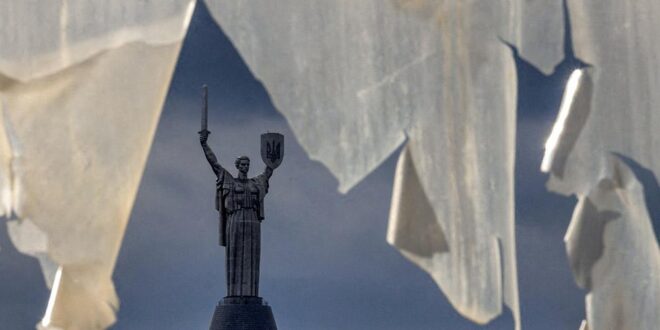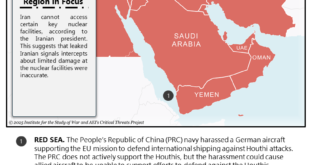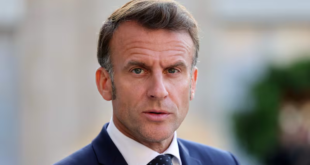What seemed at first to be the start of a Third World War has turned out to be more akin to a Second Yugoslav War: a local conflict on the edge of Europe triggered by a slow-motion imperial collapse.
Throughout 2022, Europe was in shock. It turned out that Russia, owner of the continent’s most powerful armed forces, really was capable of sending tanks, missiles, and jets across its borders, bombing cities and seizing territory for no apparent reason, just as today’s adults were warned it might when they were children, and all while its politicians increasingly spoke in the language of tinpot dictators.
A feeling that everyone had been attacked swept Europe. Ukrainian flags were raised over buildings where even national flags had never been seen, and borders were flung open for Ukrainians in an unprecedented move.
Europe encountered a new type of refugee: one accustomed to going to cafes and the theater, one who may have arrived in a decent European car and is searching for a good school for their children. It was people like us who’d been attacked, the thinking went, and if Ukraine had not stood between Russian President Vladimir Putin and Europe, then it could have been us in their place.
The Russian army was a terrifying prospect that many believed capable of storming European capitals if it wasn’t stopped with nuclear weapons. In the end, it proved to be far less effective, but even so, the sight of destroyed cities, people huddled in subway stations by candlelight, and makeshift graves with cardboard headstones in residential courtyards was far more shocking than the films and TV series that had raised the specter of a Russian invasion in the first place.
The West’s immediate reaction was to identify with the victim, and that led to rapid action. Even sanctions once seen as extreme—like disconnecting Russia from international payment systems, freezing state assets, and cutting air transport ties—were imposed with startling speed.
In the subsequent eighteen months, the intensity of the West’s concern has faded significantly. While Europe and the United States continue to see Ukraine as a victim deserving of support, people in the West no longer feel threatened in the same way.
Paradoxically, the strength of Ukrainian resistance, which has denied Russia a resounding victory, has worked against Ukraine: Europe and the United States have taken their eye off the ball. Russians may be marching west, but it’s unclear whether they’ll ever be able to get to where they want to go. What seemed at first to be the start of a Third World War has turned out instead to be a Second Yugoslav War: a local conflict on the edge of Europe triggered by a slow-motion imperial collapse.
The war seems increasingly distant and alien, while at the same time becoming a routine affair. Protests in support of Ukraine are less and less visible, and there are fewer and fewer Ukrainian flags on display: in some places, they’re now outnumbered by Palestinian flags. The Israel-Gaza conflict has diffused the power of Kyiv’s allies and detracted global attention away from Ukraine, shattering the pro-Ukraine consensus.
As perceptions of the war have evolved, so has the image of Ukrainian President Volodymyr Zelensky. Until recently, it was almost impossible to imagine any article criticizing Zelensky, whose face graced the front covers of the world’s biggest magazines and newspapers.
This hero worship caused fury in the Kremlin, where officials would like to imagine it is they who will go down in history as classical heroes in a non-heroic age. Yet thanks to their actions in Ukraine, it was Russia’s despised opponent who seemed to be taking up that role. Compared with Zelensky in his trademark khaki attire, Russian officials posing in military fatigues looked like tourists, or second-rate cosplay fans. While they seemed to be play-acting, Zelensky had become the world’s darling.
As the Ukrainian war increasingly becomes seen as a small, peripheral war, however, the world’s view of Zelensky has also changed. He’s still a hero, just a distant one: someone else’s hero.
The power of the Zelensky effect has also weakened. When the leader of a country under attack leaves to give a speech to a foreign parliament—still wearing military fatigues—he gets a standing ovation and promises of support. The second, third, and fourth time he does it, the effect is not the same.
In addition, political heroism has another, more dangerous dimension. From being a hero and savior, Zelensky risks becoming the man who ordered others to their deaths. The mobilization that helped Ukraine to survive in 2022, and even allowed it to retake territory, is now seen by some as the reason they lost their loved ones.
Now the reduction in the intensity of hostilities in Ukraine is weakening the arguments of those calling for a big push to achieve peace. Instead, the aggression seems to be ending of its own accord.
Putin only has enough soldiers to stage local offensives that are unable to significantly move the front line. Moscow does not want to enact another unpopular round of mobilization, and the Kremlin is hoping Ukraine will simply run out of men for defense first, so that Russia has enough to mount an offensive.
Putin has been unable to wipe the smile off his face since the failure of Ukraine’s counteroffensive made it clear that the fighting could swing in Russia’s favor. It appears that the answer to the question “how much longer can Russia continue to wage war?” is “for as long as necessary.”
The Russian economy is doing well despite persistent inflation, the imbalances caused by rising military expenditure, and record-high interest rates. GDP grew 3.5 percent in 2023, and there was 7.4 percent growth in manufacturing, helping to smooth out some of the inequality between poorer and wealthier regions. Moscow continues to reap large profits from oil and gas exports. Economically speaking, it’s clearly possible for ordinary life in Russia to continue despite the war.
The relatively low intensity of the fighting and Putin’s imminent reelection as president mean the brutal new version of Russia is here to stay. In the West, the idea that dealings with Russia are inevitable, whatever the nature of the regime, is gradually gaining traction—and that means the future legitimation of a dictatorship via international contacts with both the West and the East.
If contact with the West really is resumed, then sanctions will begin to look like the punishment of ordinary Russians, given the treasury’s income from international trade. And while it’s one thing for ordinary Russians to suffer from sanctions along with the regime, it’s quite another for them to suffer instead of the regime. Nor does anyone seem to have an answer to difficult questions such as: “What happens if the absence of Western servicing causes a Russian passenger plane to crash?”
Eighteen months ago, everything seemed very clear. War may have destroyed lives, upended plans, and deprived people of their homes, but it also provided an unshakable moral foundation for international unity. Now, while this clarity may remain for individuals, it’s no longer a foundation for a broader coming together. Instead, it’s now a shattered mirror where each piece reflects something independently of the others.
We should be striving to retain unity when it comes to what is most important to us, despite social and political turmoil. For the moment, though, it feels as if we’re living through the darkest hour.
 Eurasia Press & News
Eurasia Press & News



